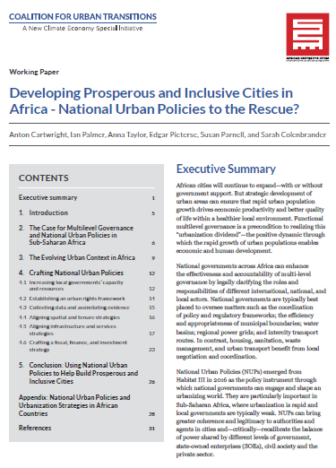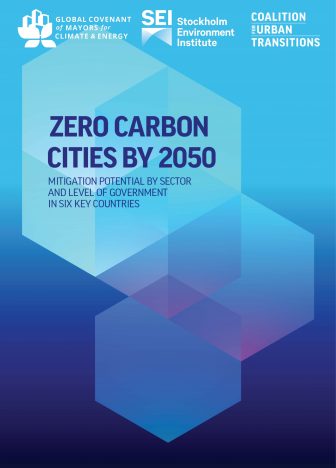Africa’s cities are set to grow by nearly a billion people by 2050. Strategic planning by government leaders now can make the difference between those cities being dynamic, healthy, climate-resilient hubs driving nationwide prosperity, or sprawling, polluted, congested sites of poverty and insecurity.
New research by the African Centre for Cities for the Coalition for Urban Transitions sets out the specific role African national governments can play to put cities onto a successful path.
National leadership is needed to guide the transformation of cities, support municipal authorities, and unlock major investment for infrastructure. But to date, only 18 African governments have National Urban Policies.
For the first time, this paper identifies key principles to guide the development of successful National Urban Policies in Africa and points to examples where such approaches have been successful. It recommends the Policies should:
- Clarify the specific roles, powers, responsibilities and rights of national government, local authorities, utilities, civil society, households and businesses, including in law, so that they can work more effectively together towards a shared urban vision
- Establish a clear spatial strategy to promote compact, connected and coordinated city development and link this to land tenure reform in order to improve the resilience of low-income households and local revenue collection
- Establish a clear infrastructure strategy that reduces the cost of energy, transport and water for urban Africans, who typically pay a 29% premium for these services
- Establish a clear fiscal and financing strategy that increases public budgets and improves project preparation for sustainable urban infrastructure and can encourage private investment
- Commit to increase the capacities and resources of urban governments so they can fulfil their legal mandates – from waste collection to land use planning
- Foster a culture of social justice by articulating the rights of all citizens and facilitating their participation in political processes
- Support the collection and sharing of evidence and data – particularly from informal settlements and economies, to allow better decision-making
The research has been welcomed by leading experts:
Towns and cities across Africa are growing rapidly – with or without government support. Strategic planning and policies are needed if they are to become dynamic hubs of hope and economic opportunity rather than sprawling sites of poverty, inequality and pollution. National government leadership is needed to mobilise the investment for much-needed infrastructure, and establish the incentives and regulations to drive inclusive, well-planned urban growth. But national action alone is not enough. The biggest economic and social rewards will come to national governments that support and convene everyone – households, businesses, civil society and local governments – to shape a better future for Africa’s towns and cities.
Carlos Lopes, Global Commissioner on Climate and the Economy and High Representative for the African Union
Africa’s future is urban – but its towns and cities will only thrive if they deliver climate-resilient housing, infrastructure, services and jobs for everyone. We have a short window of opportunity to put in place strategic plans that can lift millions of people out of poverty and reduce their vulnerability to climate risk. National governments need to set the framework for this, with National Urban Policies that enable local governments, communities and businesses to work together to deliver cities for all.
Sarah Nandudu, Vice Chairperson of the National Slum Dwellers Federation of Uganda and Deputy Chair of the Board of Slum Dwellers International (SDI)
By drawing from existing examples, our research was able to distill key lessons for national governments seeking to harness the urbanisation trend and help their cities drive growth and development in the next few years.
Lead author Anton Cartwright, African Centre for Cities



